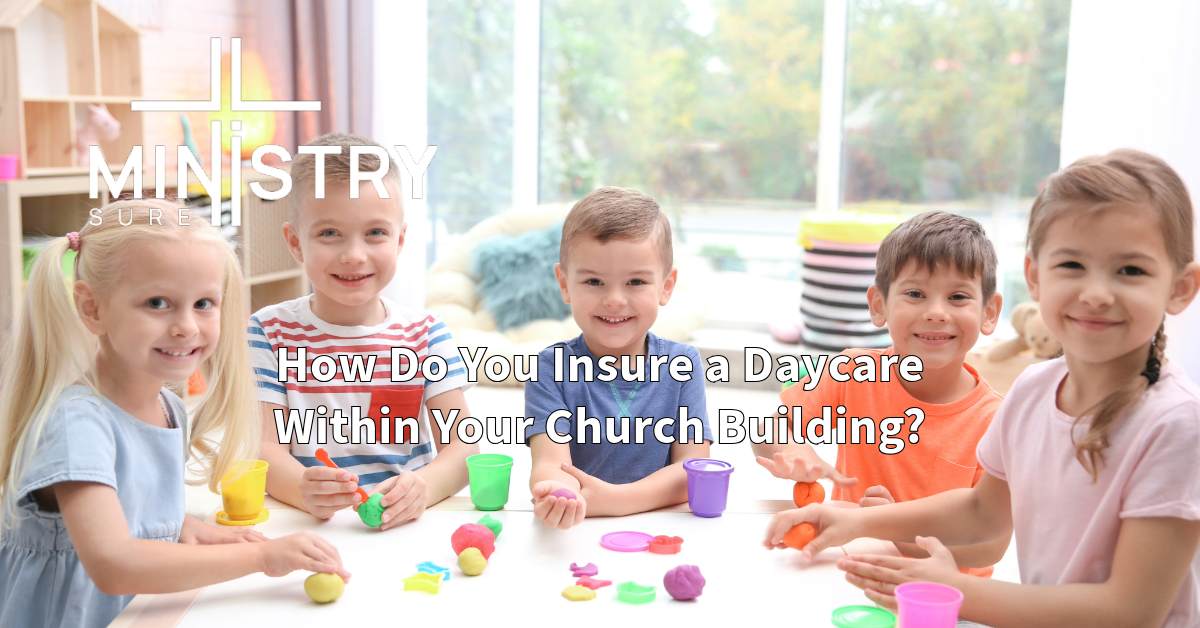Operating a daycare within a church building brings unique rewards and responsibilities. While it serves as a valuable resource for families and an extension of the church’s mission, it also introduces new risks and liabilities. Ensuring that both the church and daycare have the appropriate insurance coverage is essential to manage these risks effectively. In this guide, we’ll discuss the types of insurance policies needed, how to address potential liability, and the role of an insurance agent in selecting the right coverage for your church’s daycare.
Key Insurance Policies to Consider

A daycare within a church setting requires a mix of both general and specialized insurance coverages. While many churches already carry some form of property insurance and liability insurance, these may not be adequate for the additional risks associated with daycare operations. Here are some essential types of insurance to consider:
- Commercial Property Insurance
Commercial property insurance covers physical assets within the church, including the building itself, furniture, daycare equipment, and any personal property associated with the daycare’s operations. This insurance is crucial in case of property damage due to events like fire, vandalism, or a natural disaster. Because the daycare is housed within the church, the church’s property insurance might need an adjustment to cover these specific risks, especially as they pertain to areas dedicated to childcare. - General Liability and Professional Liability Insurance
Liability insurance protects against potential lawsuits from incidents on the church property. For a daycare, general liability coverage is essential to address claims that might arise if a child is injured while under the care of the daycare. In addition to general liability, professional liability insurance may be advisable for daycare employees, as it covers incidents related to supervision and caregiving activities, especially in cases of alleged negligence. - Abuse and Molestation Coverage
Given the church’s role in caring for children, having abuse and molestation coverage is vital. This specialized coverage protects the church and daycare in the event of allegations or claims related to misconduct, providing financial protection for legal defense and associated costs. Insurance policies with abuse and molestation coverage offer a critical safeguard, ensuring that the church and daycare are prepared for unforeseen allegations and their potential impact on finances and reputation. - Workers’ Compensation Insurance
If the daycare has paid staff members, workers’ compensation insurance is essential. This policy covers medical bills and lost wages for employees who may be injured while working. In many states, workers’ compensation insurance is legally required, even for nonprofit organizations, so it’s important to confirm compliance with local regulations. - Commercial Auto Insurance
In cases where the daycare provides transportation for children—such as trips to local parks or educational outings—commercial auto insurance is essential. This coverage protects against liability and damages resulting from accidents involving church-owned or rented vehicles used for daycare purposes. It can also include coverage for non-owned vehicles, which is beneficial if employees use their personal cars for daycare activities.
Addressing Liability Risks in a Daycare Setting
Operating a daycare introduces unique liability risks that extend beyond those typically associated with church functions. For instance, if a child sustains an injury on the premises, the church could face significant liability if it does not have adequate coverage. In daycare settings, there is also a higher potential for incidents requiring legal defense, including claims related to neglect or accidents. Addressing these risks effectively requires a combination of well-defined insurance policies and comprehensive risk management strategies, such as regular safety assessments, staff training, and strict supervision policies.
Risk Management Strategies for Daycares in Church Buildings
To minimize potential liability and create a secure environment, consider implementing the following risk management practices:
- Thorough Background Checks
Conducting background checks on all daycare employees and volunteers is a fundamental step in protecting children and maintaining trust within the community. Comprehensive background checks help ensure that the church is compliant with best practices in child safety and limit the risk of hiring individuals with histories that could pose a threat. - Safety Protocols and Staff Training
Training staff on safety procedures and establishing clear protocols is essential for minimizing accidents and ensuring proper supervision. Protocols might include maintaining staff-to-child ratios, creating an emergency action plan, and conducting regular safety drills to prepare for incidents like natural disasters or medical emergencies. Providing training on how to recognize and report suspicious behavior or child abuse is equally important to foster a safe daycare environment. - Childproofing and Regular Facility Inspections
Childproofing the daycare area within the church is another important aspect of risk management. This might involve installing child-proof locks, using outlet covers, and ensuring that all equipment and furniture are safe for young children. Regular inspections of the daycare facility can help identify potential hazards, allowing the church to address issues proactively and prevent property damage or injuries.
The Role of an Insurance Agent in Selecting the Right Coverage
Navigating the complexities of insuring a daycare within a church building can be challenging, particularly when it comes to understanding specific coverage needs and ensuring comprehensive protection. Working with an experienced insurance agent who specializes in church insurance or nonprofit organizations can simplify this process. An insurance agent can assess the church’s existing policies, recommend additional coverage tailored to the daycare’s needs, and help the church make informed decisions on policies and premiums. They can also assist with understanding the claims process in the event of an incident, ensuring that the church and daycare are prepared to respond effectively to potential risks.
Benefits of Comprehensive Insurance Coverage for Church-Operated Daycares
Investing in comprehensive insurance coverage for a daycare within a church building offers several advantages. Not only does it protect the church’s financial resources in the event of a claim, but it also provides peace of mind to church leaders and parents alike, knowing that the daycare is prepared for various potential scenarios. With the right combination of property insurance, liability insurance, and abuse and molestation coverage, the church can confidently offer daycare services while safeguarding its property and mission.
Comprehensive insurance also reinforces the church’s commitment to accountability and safety, showing the community that it takes child welfare seriously. For larger churches with multiple programs, having specialized insurance for the daycare center can also prevent financial strain on other church activities if a claim arises, maintaining the church’s stability and its ability to serve its congregation.
Securing Your Church’s Daycare
As daycares continue to become valuable assets within church communities, ensuring their protection through appropriate insurance coverage is crucial. By assessing the unique needs of a daycare facility, addressing potential liabilities, and implementing proactive risk management practices, churches can create a safe, supportive environment for children and staff alike. Working with an experienced insurance provider who understands the nuances of church-operated daycares allows church leaders to focus on their mission, knowing they have a safety net in place.






